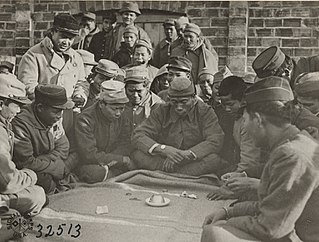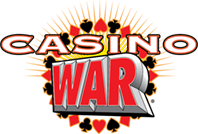
Blackjack, formerly also Black Jack and Vingt-Un, is the American member of a global family of banking games known as Twenty-One, whose relatives include the British game of Pontoon and the European game, Vingt-et-Un. It is a comparing card game between one or more players and a dealer, where each player in turn competes against the dealer. Players do not compete against each other. It is played with one or more decks of 52 cards, and is the most widely played casino banking game in the world.

Craps is a dice game in which the players make wagers on the outcome of the roll, or a series of rolls, of a pair of dice. Players may wager money against each other or a bank. Because it requires little equipment, "street craps" can be played in informal settings. While shooting craps, players may use slang terminology to place bets and actions.

Chuck-a-luck, also known as birdcage, is a game of chance played with three dice. It is derived from grand hazard and both can be considered a variant of sic bo, which is a popular casino game, although chuck-a-luck is more of a carnival game than a true casino game. The game is sometimes used as a fundraiser for charity.

Gambling is the wagering of money or something of value on an event with an uncertain outcome, with the primary intent of winning money or material goods. Gambling thus requires three elements to be present: consideration, risk (chance), and a prize. The outcome of the wager is often immediate, such as a single roll of dice, a spin of a roulette wheel, or a horse crossing the finish line, but longer time frames are also common, allowing wagers on the outcome of a future sports contest or even an entire sports season.

Roulette is a casino game named after the French word meaning little wheel. In the game, players may choose to place bets on either a single number, various groupings of numbers, the colors red or black, whether the number is odd or even, or if the numbers are high (19–36) or low (1–18).

Baccarat or baccara is a card game played at casinos. It is a comparing card game played between two hands, the "player" and the "banker". Each baccarat coup has three possible outcomes: "player", "banker", and "tie". There are three popular variants of the game: punto banco, baccarat chemin de fer, and baccarat banque. In punto banco, each player's moves are forced by the cards the player is dealt. In baccarat chemin de fer and baccarat banque, by contrast, both players can make choices. The winning odds are in favour of the bank, with a house edge no lower than around 1 percent.
Spread betting is any of various types of wagering on the outcome of an event where the pay-off is based on the accuracy of the wager, rather than a simple "win or lose" outcome, such as fixed-odds betting or parimutuel betting.
A martingale is any of a class of betting strategies that originated from and were popular in 18th-century France. The simplest of these strategies was designed for a game in which the gambler wins the stake if a coin comes up heads and loses it if the coin comes up tails. The strategy had the gambler double the bet after every loss, so that the first win would recover all previous losses plus win a profit equal to the original stake. The martingale strategy has been applied to roulette as well, as the probability of hitting either red or black is close to 50%.

Card counting is a casino card game strategy used primarily in the blackjack family of casino games to determine whether the next hand is likely to give a probable advantage to the player or to the dealer. Card counters are a class of advantage players, who attempt to reverse the inherent casino house edge by keeping a running tally of all high and low valued cards seen by the player. Card counting allows players to bet more when the count gives an advantage as well as minimize losses during an unfavorable count. Card counting also provides the ability to alter playing decisions based on the composition of remaining cards.
Online casinos, also known as virtual casinos or Internet casinos, are online versions of traditional casinos. Online casinos enable gamblers to play and wager on casino games through the Internet. It is a prolific form of online gambling.
A betting strategy is a structured approach to gambling, in the attempt to produce a profit. To be successful, the system must change the house edge into a player advantage — which is impossible for pure games of probability with fixed odds, akin to a perpetual motion machine. Betting systems are often predicated on statistical analysis.
Spanish 21 is a blackjack variant owned by Masque Publishing Inc., a gaming publishing company based in Colorado. Unlicensed, but equivalent, versions may be called Spanish blackjack. In Australia and Malaysia, an unlicensed version of the game, with no dealer hole card and significant rule differences, is played in casinos under the name "Pontoon". It was first introduced about 1995.
A progressive jackpot is a jackpot which increases each time the game is played but the jackpot is not won. When the progressive jackpot is won, the jackpot for the next play is reset to a predetermined value, and resumes increasing under the same rule.

Casino War is a proprietary casino table game based on the game of War. It is distributed by Shuffle Master, a division of Scientific Games. The game is one of the most easily understood casino card games.

A fixed odds betting terminal is a type of electronic slot machine normally found in betting shops in the United Kingdom and introduced in 2001. The terminals allow players to bet on the outcome of various games and events which have fixed odds, with the theoretical percentage return to player (RTP) displayed on the machine by law. Like all casino games, the "house" has a built-in advantage. Typically, slot machine FOBTs have an RTP of 90% to 94% depending on the chosen stake, and standard roulette FOBTs have a long-term average RTP of 97%.
Even money is a wagering proposition with even odds - the bettor stands to lose or win the same amount of money. Beyond gambling, even money can mean an event whose occurrence is about as likely to occur as not. Even money is also known as 50–50.
The mathematics of gambling are a collection of probability applications encountered in games of chance and can be included in game theory. From a mathematical point of view, the games of chance are experiments generating various types of aleatory events, the probability of which can be calculated by using the properties of probability on a finite space of events.
Advantage gambling, or advantage play, refers to legal methods, in contrast to cheating in casinos, used to gain an advantage while gambling. The term usually refers to house-banked games, but can also refer to games played against other players, such as poker. Someone who practises advantage gambling is often referred to as an advantage player, or AP. Unlike cheating, which is by definition illegal, advantage play exploits innate characteristics of a particular game to give the player an advantage relative to the house or other players. While not illegal, advantage play is often discouraged and some advantage players may be banned by certain casinos.
In the context of casinos, comps are complimentary items and services given out by casinos to encourage players to gamble. The amount and quality of comps that a player is given usually depends on a combination of factors: what game(s) they play, how much they bet, and how long they play.

Splitting aces and eights is part of blackjack basic strategy. Rules vary across gambling establishments regarding resplitting, doubling, multiple card draws, and the payout for blackjack, and there are conditional strategic responses that depend upon the number of decks used, the frequency of shuffling and dealer's cards. However, regardless of the various situations, the common strategic wisdom in the blackjack community is to "Always split aces and eights" when dealt either pair as initial cards. This is generally the first rule of any splitting strategy.












